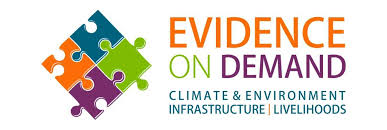Location
Evidence on Demand was a resource service providing high-quality information in the fields of climate, environment, infrastructure, and livelihoods. The information hub provided access to a broad range of documents, learning resources and technical expertise. One of the key functions of the service was to assist U.K. Department for International Development (DFID) advisers and the wider international development community in making informed, evidence-based decisions. The expert team behind Evidence on Demand was co-led with IMC Worldwide Ltd in a joint venture.
Sample Activities
- Provided support to DFID via quality-assured learning products and services such as topic guides, training support and e-learning, quarterly e-bulletins, development of structured professional development materials, and a shared document library.
- Developed and maintained a HelpDesk Facility to provide DFID with rapid access to high-quality evidence and knowledge products such as document searches, synthesis of reviews, literature reviews, briefing notes, preparation of technical specifications, and short expert reviews.
- Engaged high-quality expertise to undertake studies or new research, provided assistance with programme development, and supported DFID with additional expertise on complex issues.
Select Results
- HelpDesk service handled up to 80 requests per year.
- Successfully elicited regular contributions from top academics and people on the front line of development work.
- Launched website feature “Talking Point,” which provides a space for expert comment and opinion on issues surrounding climate, environment, infrastructure, and livelihoods.
Members:
Resources
Displaying 6 - 10 of 21Public overseas investments: ensuring respect for and protecting legitimate land tenure rights: rapid evidence assessment
This rapid evidence assessment (REA) investigates how public overseas investments supported by developed country governments respect legitimate land tenure rights, especially in countries without a strong system for protecting existing tenure rights. The REA assesses material from the limited number of studies (20) available about donor-supported investment projects involving land. Most are from African countries, but the evidence also includes cases from Afghanistan, Guatemala and Cambodia.
Helpdesk Report: Rwanda Land Tenure Regularisation Case Study
Includes context, project objectives, coverage, cost, delivery and achievements, beneficiaries – communications and targeting, gender, innovations, employment and training, lesson learning, flexibility, geographical scope, government ownership and political will, sustainability, capacity of the justice sector to address land disputes, reliability and scalability of approach taken.
Rwanda Land Tenure Regularization Case Study
This case study has been produced in response to a request to the Evidence on Demand Helpdesk. The objective of the request was to provide a detailed case study on the approach taken to land tenure reform by the DFID-funded Land Tenure Regularisation Programme (LTRSP) in Rwanda. The case study should provide the reader with an understanding of how land tenure reform can work under particular social, political and economic conditions, as well as the approach taken to ensure gender equality in land rights.
Topic Guide: Land
Divided into 4 Sections: growing interest in land: large-scale land acquisition; reactions to rising interest in land at the national and international level; land reform and policy: types, impacts (including gender) and risks; land in fragile and conflict-affected states. A number of Topic Guides are being produced for DFID’s Climate, Environment, Infrastructure and Livelihoods Advisers. They are designed to be useful to development professionals.
Topic Guide: Land
Written by ODI's Anna Locke and Giles Henley, the guide provides a summary of the latest thinking around contemporary global land issues in developing countries. It also gives guidance on and evidence for how this thinking can be used in practice; provides signposting to reliable sources that can inform development professionals on issues not covered in the Topic Guide; and highlights where there are gaps in knowledge and evidence.




